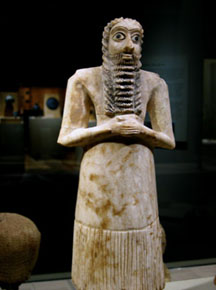Sixième partie - Conclusion
Une série d'essais discutant certaines récusations rencontrées par les Praticiens du Zen Occidental
Le Bouddhisme est une religion complexe sans aucune voix, ayant plusieurs visages ainsi que plusieurs représentants qui ont chacun des vues diverses. Il est très facile pour un nouveau-venu de se perdre dans des fusions de croyance, de langues

ambiguës, d'habitudes, d'enseignements, de superstitions et de mythes qui ont produit de cette religion inhabituelle et expansive une œuvre comme celle de Mata.
Nous ne devons pourtant pas nous permettre de manquer la forêt pour l' arbre. Le secret du Chan, comme Maître Hsu Yun le répétait souvent, est découvrir cette lumière intérieure qui est la Nature Bouddhique. L'effort demandé n'est pas dans la recherche mais bien dans le fait d'abandonner, de laisser.
Suivez le Sentier et évitez les engagements samsariques dans des groupes et des organisations. Suivez ce Sentier par le Dharma qui vous sied. Chacun de nous est unique dans sa propre disposition, attitudes, habilites et intérêts - il n'y a pas de Sentier unique du Dharma auquel il faut se conformer.
 Identifiez l'institution du Zen comme étant telle, une institution, et non le Sentier lui-même. Suivez votre vie où l'amour vous emmène - à être danseur, écrivain ou enseignant, artiste, charpentier ou parent - chaque activité est une opportunité de vivre le Chan.
Identifiez l'institution du Zen comme étant telle, une institution, et non le Sentier lui-même. Suivez votre vie où l'amour vous emmène - à être danseur, écrivain ou enseignant, artiste, charpentier ou parent - chaque activité est une opportunité de vivre le Chan.
Empruntant les paroles de Nuage Vide, " Nos activités quotidiennes sont exécutées dans le Sentier Lui-même. Y a t'il quelque part un endroit qui ne soit pas un endroit requis pour pratiquer le Sentier? La salle du Chan ne devrait même pas être Nécessaire. "
Cent mille mondes sont des fleurs dans le ciel
Un seul corps et esprit, le reflet de la lune sur l'eau.
Dès que la ruse finit et que l'information s'arrête,
A ce moment là, la pensée n'a plus de place.
- Grand- Maître Hanshan Déqing, 1564-1623
Les lecteurs désireux d'en savoir plus sur les sujets énoncés ici peuvent trouver des informations utiles dans les références ci-dessus.
Les écrits de Stuart Lachs
Stuart Lachs est un pratiquant Zen Bouddhiste depuis plus de 40 ans, il a étudié sous nombreux maîtres dans les temples et centres d'entraînements aux Etats unis, en Europe, en Corée, au Japon et Taiwan.
Il est une ressource de valeur pour la Communauté Bouddhiste pour ses grandes expériences des Institutions du Zen tout comme également sa compréhension du Zen/Chan et ses engagements de protéger et préserver le Dharma du Bouddha. Certaines de ses œuvres incluent :
Means of Authorization: Establishing Hierarchy in
Ch'an/Zen Buddhism in America
Copyright (c) 1999, Stuart Lachs
Richard Baker and the Myth of the Zen Roshi
Copyright (c) 2002 Stuart Lachs.
Coming Down from the Zen Clouds
A Critique of the Current State of American Zen
Copyright (c) 1994, Stuart Lachs.
Traduction: Fa Lian Shakya,OHY
